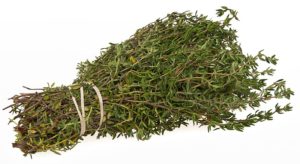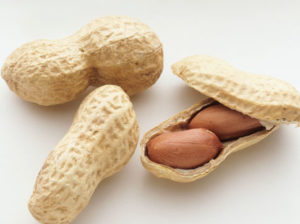
It turns out that even making minor adjustments to your usual diet can improve the gut microbiome (the community of bacteria, fungi, viruses living in the gut) within a few weeks. Two separate studies found that eating some peanuts daily or adding some herbs or spices to the foods you eat can improve the numbers of beneficial bacteria living in the gut.
 In the peanut study - eating or not eating peanuts didn't change the diversity or main types of bacteria living in the gut. But eating peanuts did increase the numbers of several beneficial species --Roseburia and Ruminococcaceae, which are butyrate producing bacteria (good!). The peanut group ate 28 grams of peanuts (1 ounce or about 33 peanuts) as a night-time snack for 6 weeks.
In the peanut study - eating or not eating peanuts didn't change the diversity or main types of bacteria living in the gut. But eating peanuts did increase the numbers of several beneficial species --Roseburia and Ruminococcaceae, which are butyrate producing bacteria (good!). The peanut group ate 28 grams of peanuts (1 ounce or about 33 peanuts) as a night-time snack for 6 weeks.
In the spice and herb study, adding a combination of spices and herbs to the diet for 4 weeks increased microbial diversity in the gut (good!), and also increased beneficial Ruminococcaceae numbers (good!) in persons at risk for heart disease. Faecalibacterium and Agathobacter numbers also increased (good!). A variety of dried spices and herbs (1/8 tsp, 3/4 tsp. or 1/1/2 tsp) were added to foods in the daily diet, and not taken as a capsule.
Dried spices added to foods in the spice and herb study included coriander, cumin, allspice, cinnamon, oregano, thyme, onion powder, garlic, ginger, rosemary, thyme, basil, black pepper, paprika, parsley, red pepper, etc. - 24 in all!
Bottom line: These studies agree with other research finding that eating peanuts (and all sorts of nuts, legumes), as well as adding spices and herbs to your foods is beneficial to the gut microbiome. They feed beneficial microbes in your gut, have all sorts of micronutrients, and they also have multitudes of microbes. A win-win.
From Science Daily: Peanuts and herbs and spices may positively impact gut microbiome
Adding a daily ounce of peanuts or about a teaspoon of herbs and spices to your diet may affect the composition of gut bacteria, an indicator of overall health, according to new research from Penn State. In two separate studies, nutritional scientists studied the effects of small changes to the average American diet and found improvements to the gut microbiome.
The human gut microbiome is a collection of trillions of microorganisms that live inside the intestinal tract. The bacteria there can affect nearly all systems of the body, including metabolism and the building and maintaining of the immune system.
"Research has shown that people who have a lot of different microbes have better health, and a better diet, than those who don't have much bacterial diversity," said Penny M. Kris-Etherton, Evan Pugh University Professor of Nutritional Sciences, Penn State.
For the peanut study, which published in the journal Clinical Nutrition, Kris-Etherton and her colleagues compared the effects of snacking on 28 grams (approx. 1 ounce) of peanuts per day, versus a higher carbohydrate snack -- crackers and cheese. At the end of six weeks, participants who ate the peanut snack showed an increased abundance of Ruminococcaceae, a group of bacteria linked to healthy liver metabolism and immune function.
In the herbs and spices study, which published in The Journal of Nutrition, scientists analyzed the impact of adding blends of herbs and spices -- such as cinnamon, ginger, cumin, turmeric, rosemary, oregano, basil and thyme -- to the controlled diets of participants at risk for cardiovascular disease. The team examined three doses -- about 1/8 teaspoon per day, a little more than 3/4 teaspoon per day and about 1 1/2 teaspoon per day. At the end of four weeks, participants showed an increase in gut bacteria diversity, including an increase in Ruminococcaceae, most notably with the medium and high doses of herbs and spices.
"It's such a simple thing that people can do," said Kris-Etherton.
In both studies, the increase in Ruminococcaceae and bacterial diversity was viewed positively, as scientists continue to learn more about the connection between the gut microbiota and a spectrum of health factors, from blood pressure to weight. However, Kris-Etherton is quick to point out that more research is needed to understand all of the implications.
